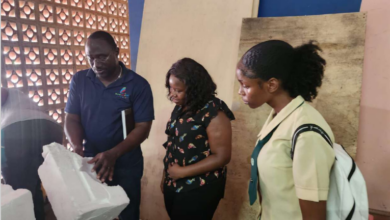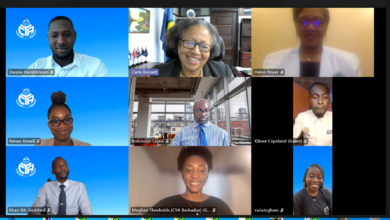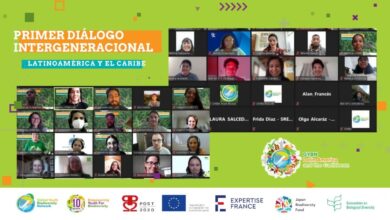His Excellency, President Venetiaan
Members of the Council of Ministries
Members of Development Organisations
Honourable Guests
Youth Ambassadors,
Ladies and Gentlemen
Good afternoon/Hoodamida!
It is my pleasure to bring you greetings on behalf of the Secretary General and staff of the Caribbean Community and to address this important regional youth assembly.
While the mandate for the CARICOM Youth Ambassadors Programme was given at the Heads of Government Conference that commemorated the 20th anniversary of the signing of the Treaty of Chaguaramas at their meeting in Dominica (1993); and while several youth fora have been held; this is the first Regional Youth Assembly of the full complement of Youth Ambassadors, since that time. I ask you to duly acknowledge the significance of this inaugural Assembly.
This Assembly takes on even greater significance partly due to the fact that it is being held in the week immediately following International Youth week when several of you would have come with ideas from the discussions that engaged the youth in your respective countries. It takes on added significance for another reason. And it is this: the President of Suriname has the regional portfolio for culture, youth, sport and gender within the quasi Cabinet of the CARICOM Community. We are therefore all delighted that His Excellency President Venetiaan can honour us with his presence and wish to thank the Government of the Republic of Suriname for the excellent arrangements that it has put in place and for its gracious hospitality.
We also wish to thank The European Commission and UNICEF for their generous sponsorship of this event and to all those members of the steering Committee and the local Committee that worked tirelessly to make this event possible. I also must recognise the efforts of Dr. Johnson and other members of the CARICOM Secretariat. I ask you to acknowledge this and to give them our warm appreciation.
Building on the Historical Caribbean-Suriname Bonds
In meeting here today in Suriname we need to reflect on the close historical bonds between the Dutch and English Caribbean through colonization, migration, shared social and economic relations. Guyana, formerly British Guiana, and headquarters of CCS, share with Suriname a Dutch heritage, due to the fact that the Dutch conquered and settled in El Dorado, as it was then called in the 18th and 19th centuries and built dykes and other settlements. So much so, that the physical appearance of Guyana and Suriname are quite similar and Villages with names such as Beterverwagten, Uitvlugt and Llusigan are to be found in Guyana. Labourers from Barbados migrated to Suriname in the early decades of this century, the introduction of the oil refineries in Aruba and Curacao in the 1920s resulted in an influx of workers from the English speaking Caribbean and Suriname. More recently, Haitians and Guyanese have migrated to Suriname. It is therefore a natural progression of these developments that Suriname became a full member of the CARICOM Community in 1995. And it is most reasonable as we look to the future to expect that this meeting will be a catalyst for accelerating a greater CARICOM presence in Suriname and conversely, a more active Suriname role in the Community.
The Context of this Regional Youth Assembly
We meet here at The Regional Youth Assembly at a time when the Region is experiencing an economic crisis. It is one that is endemic to the current status of globalisation in which several countries in the developing world have difficulty in making the transition from an economic system that offered preferences for their primary products to one in which those preferences are being gradually removed. Dominica is a case in point in which its earnings from exports of bananas declined by 75 percent over the past 2 years. The equally imposing aspects of Globalisation are the rapid changes in information technology and the prominence of a knowledge based industralization process that small countries like ours in the Caribbean find it difficult to keep up with the pace and to compete as single entities.
The Characteristics of the Current Crisis make it necessary for priorities to be established and for member states to evolve common strategies to confront increasing global economic challenges. There is also the need to find solutions to the huge international debt payments, high incidence of unemployment, alarming levels of crime, and declining flows in development aid. In addition, there is the need to articulate for special consideration as vulnerable small states as CARICOM states, from the newest and poorest, Haiti, to once thriving economies like Barbados, are grappling for solutions to threatening social and economic problems.
Policies for Coping with the Current Crisis
The recently concluded special meeting of CARICOM Heads of Government in Saint Lucia made some bold steps to avert the economic crisis with the assistance of the Caribbean Development Bank and the Eastern Caribbean Central Bank. These include:
The establishment of a Regional Stabilisation Fund, which is essentially a special financing mechanism to assist economies survive the current crisis.
The scaling up of implementation of the CARICOM Single Market and Economy (CSME) as a critical requirement for international competitiveness and resuscitation of economic growth with special emphasis on the free movement of persons and services.
The challenge of region-wide economic reconstruction, which involves concerns about public sector management issues that have been highlighted by the crisis situation of a number of national economies.
To these urgent economic policies must be added the necessity to ensure the quality of governance, transparency and information availability or accountability.
The recent meeting between the Heads of Government and civil society held in Guyana in July 2002 warned that attention to these governance issues is critical to the region's competitiveness. Membership in the FTAA, to which the region is obviously committed means that the CARICOM as a Region, must get it's act together, and soon.
If one could put a positive spin on this, the entire “grappling” exercise presents a great opportunity for youth to inject the process with its wealth of ideas, enthusiasm, idealism, vision, energy and willingness to take risks. Most of all, the tendency of Youth to think “outside of the box” should be viewed as a great asset. There is a tendency for too many persons to feel that the Caribbean has no future, and that in order to “make life”, one has to leave the Region. Our Youth need to know that they have a responsibility to be involved in the process, and that by their involvement, they contribute a much needed ingredient: hope!
Imperatives for Positioning the Youth in the Process of Change
We meet to discuss the variety of issues that focus on the ways that the youth of our Region can contribute to the development of this Region. On the one hand it may take the form of confronting the status quo. On the other, it may mean working towards complimenting the role of the state by seeking expression within civil society, by carrying out civil responsibilities as part of a volunteer group that aims at giving something back to the Community, the school, the nation or the region: giving back rather than only taking.
For you to play a constructive role there are some basic imperatives. These can be fashioned in the way of searching questions:
Where do I hope to be in five years time? If a plan exists, what am I doing in order to realize those plans? Positive attitudes such as lifelong learning result in developing the individual. Information Technology currently presents an enormous opportunity. What can I do/am I doing to take advantage of the learning environment?
What are my core beliefs, and how do they affect the decisions that I make? Do you have personal ethics? How do they help an individual in resisting the temptation that drugs (using and/or dealing) and irresponsible sexual behaviour present, for example?
What can I contribute to my community/environment/country? How can I contribute to effective change or sustainable development? Picture a bicycle wheel representing the crisis faced by the Region, and each of its spokes as a challenge contributing to the overall crisis. Among these challenges are:
Crime and Violence.
Drug abuse and the drug trade's links to violence.
HIV/AIDS, particularly for young women.
The shrinking labour market.
Migration of skilled persons (nurses, teachers, other categories of workers).
Cultural Identity and racial tensions.
Environmental degradation: the urban ghetto exacerbating the Youth at risk.
Poverty – poor single mothers in a vicious cycle of violence and hopelessness.
These are all challenges that get into gear as the bicycle gains momentum. Unless as the rider of the cycle you can exercise control over this growing momentum you can, I am sure, envisage major accidents along the way.
CARICOM's Role in Facilitating a More Enabling Environment for the Youth
In the Directorate of Human and Social Development, in which the Youth Programme falls, we have the responsibility for coordinating activities that facilitate policy directives/decisions on these social issues. We have had to change our approach to our work; we have rearranged our thinking by looking not only at the spoke, but the hub from which they radiate and which gives cohesion in motion.
So, for example, when we look at Youth Issues as an area of concern, we have to consider the health of our Youth, particularly the HIV/AIDS crisis, and consider how to better prepare our students in school through our presentation of Health and Family Life Education. If the young person is unhealthy, he/she may not be able to work, and so the labour market is affected. It also means that in addition to being dependent on his/her parents, the young person is unable to contribute to the wider society through the payment of taxes and social security contributions. The current challenge presented by the drug culture has captured many inner city youth, and has resulted in a lack of respect for human life and property. Without a relevant educational system, many Youth are marginalised, and in their lack of hope and inability to reason, see violence as their only recourse. In making education relevant, we have to consider the training given to our young people, particularly training in technology, and so we have to look at how our teachers are trained.
Then too young mothers without financial security continue to have children, and are in most cases abandoned by the fathers of the children. The result is that children start out begging, and end up in criminal activities, jail or dead.
Our task as part of the Council of Human and Social Development (COHSOD) is to get out partners in the public and private sectors to join us in the quest to invest in human resource with equity.
Even as we deliberate on how best to seek solutions for our Youth through the same inter-sectoral mechanism I just described, we are conscious of the fact that we need to hear a lot more from you. It is your perspective on how to tackle many of the “spokes” of the wheel that we need to incorporate in our policy decisions, activities and as we prepare our programmes of work.
Given the time limitations we have consulted with the Directors of youth programmes and have highlighted HIV/AIDS, reduction of demand for illicit drugs and environmental protection as the focus of this Regional Youth Assembly.
Response of Youth Ambassadors
Armed with knowledge of some of the issues, this RYA must begin to consider how to assist leaders to overcome this crisis and plan for a more sustainable future. There are opportunities for Youth to be heard through mechanisms such as civil society, and through programmes such as the Youth Ambassador's Programme. For their participation to be meaningful, however Youth will have to create the opportunities to make their involvement work, by spearheading discussions on critical strategies for their own countries. This will require collaboration at the national levels, and in this way could contribute to a viable and sustainable Caribbean Region. There is need to advocate for greater inter-regional exchanges, and for a greater say in the community. If you are up to the challenge, the outcome of this meeting can take you to the next level of involvement. This will involve the following actions:
Institutionalising the Youth Ambassadors Programme.
Demanding active participation in the organs of community through a demonstration of leadership qualities: challenging the current system to achieve development with equity, with concrete and objective change policies and programmes.
Ensuring that this Youth ambassadorial corps is armed with the understanding of the value of regionalism and is committed to pushing the frontiers of a sustainable CCSME.
Participating actively at national level: building institutional capacity, articulating for youth empowerment programmes, involvement in building a culture of inclusion, tolerance, civility and where necessary, helping to radically reform the political process to achieve the appropriate changes.
Pushing the frontiers of change: entrepreneurial skills, conquering the new information environment and preparing more adequately for the knowledge based environment.
Advocating for behavioral change among the Youth to avert the spread of HIV/AIDS, reducing the demand for drugs, helping to develop schemes that promote sport and community spirit rather than crime and violence.
Bridging the gap to ensure development with equity.






